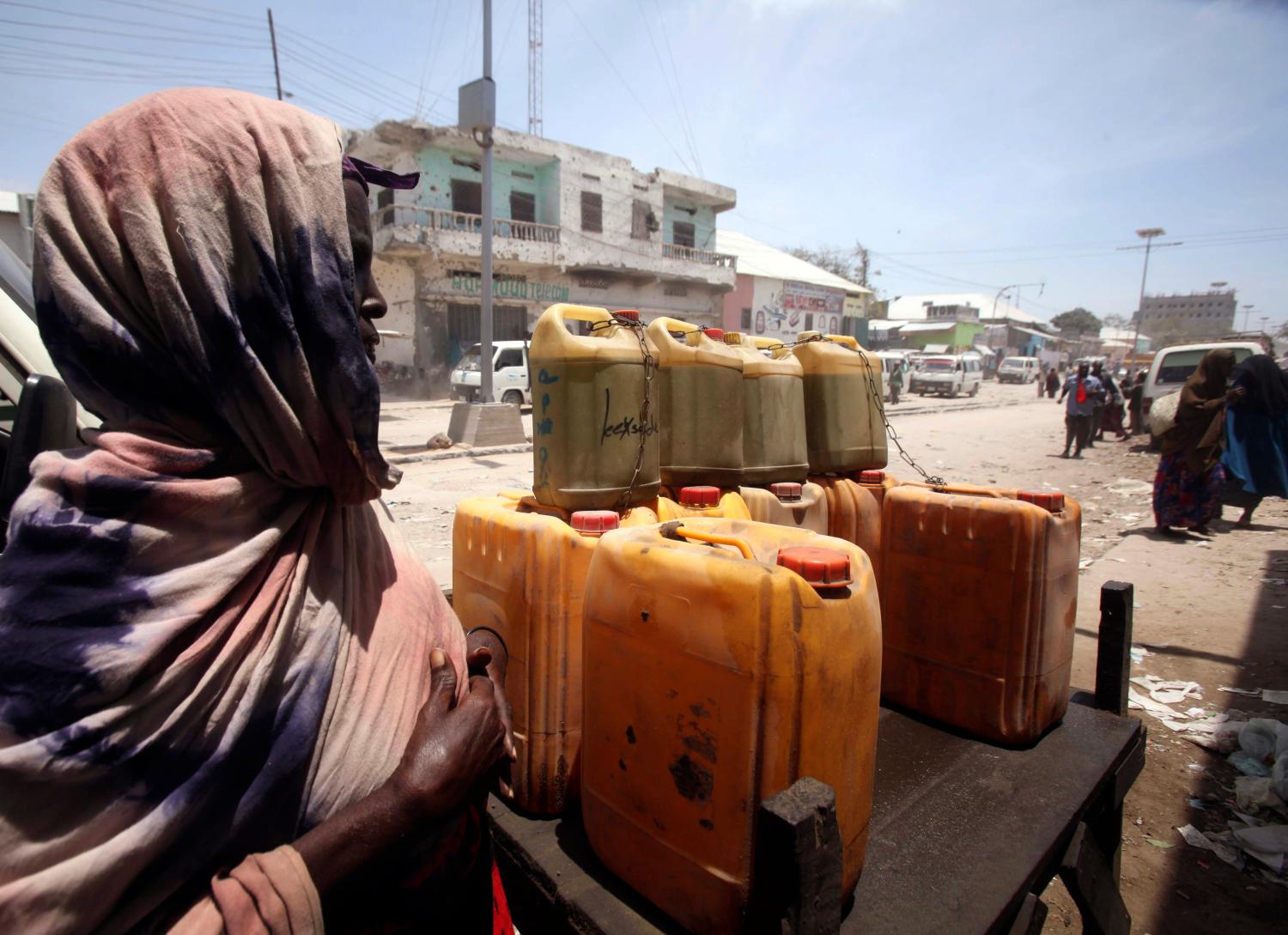Despite Africa being the “new frontier” in oil and gas resources, much of the population still has little to no access to energy and electricity. John P. Banks discusses why both these trends deserve more attention from the U.S. for economic, national security and humanitarian reasons.
This chapter is part of Top Five Reasons Why Africa Should Be a Priority for the United States. Read the full report here and tell us why you think Africa matters to the U.S. Join the conversation on Twitter using #AfricaMatters.
The Priority
The countries of sub-Saharan Africa are confronted with a confluence of energy challenges and opportunities directly relevant for U.S. foreign policy and economic interests.
The first challenge is the lack of access to affordable, modern forms of commercial energy. The International Energy Agency (IEA) estimates that there are 590 million people in sub-Saharan Africa, mostly in rural areas, without access to electricity, representing nearly 6 in 10 people in the region.[1] In addition, 700 million people, or 70 percent of the population, rely on traditional, non-commercial sources of energy, such as biomass, for cooking.
Second, with the exception of a few oil-producing states, sub-Saharan African countries do not have large domestic energy resources, relying on imports of energy for over 65 percent of total energy use.[2] The IEA recently estimated that the region spends more on oil imports ($18 billion) than it receives in international aid ($15.6 billion),[3] with attendant negative impacts on trade balances, debt and GDP growth.
Third, significant new discoveries have prompted the IEA to anoint sub-Saharan Africa the “new frontier” in global oil and gas.[4] Countries such as Cameroon, Ghana, Equatorial Guinea, the Republic of the Congo, Kenya, Tanzania and Uganda are emerging as potentially major new producers of oil. There have also been discoveries of large offshore natural gas resources in Mozambique and Tanzania, prompting plans to develop East Africa into a major exporter of liquefied natural gas. South Africa is estimated to have significant shale gas resources as well.
Why is it Important for the U.S.?
Failure to expand energy access, reduce energy imports, diversify energy sources and manage newfound oil and gas wealth for the benefit of society, especially the poor, directly impacts U.S. interests.
Humanitarian Interests
There is a clear moral imperative for the U.S. to play a leading role in expanding energy access for hundreds of millions of people in the region. Helping to lift people out of energy poverty—creating dignified living conditions and expanding economic opportunity— is consistent with our democratic values.
National Security Interests
Energy poverty undermines economic development, fueling political instability and the creation of failed states that can harbor our enemies and threaten our allies. Indeed, there is a strong correlation between political stability and electrification rates. A joint effort of the Fund for Peace and Foreign Policy magazine, the Failed States Index indicates that 15 of world’s 20 most vulnerable states are in sub-Saharan Africa, many with electrification rates below 20 percent. Among them are countries confronted with the emergence of non-state terrorist groups or undergoing violent civil strife such as Niger, Chad,Somalia and the Democratic Republic of the Congo. Mali, currently in the midst of battling a radical Islamic threat, has a rural electrification rate of just 15 percent.[5] Without commercial energy to support economic growth and modernization, the pathway to jobs and the middle class for hundreds of millions of young people will be stymied, sowing growing dissatisfaction.
The emergence of new oil and gas producers in the region presents potential benefits for U.S. national security interests, if this new-found wealth is managed appropriately. Oil and gas resources not only can provide energy and revenues for local use, but also can help stabilize oil and gas prices by diversifying and enhancing available supplies for regional and global markets. Several countries could also potentially become oil suppliers to the U.S., further diversifying the sources of U.S. imported oil.
Economic Interests
The energy trends described above offer trade and investment opportunities for U.S. businesses. In the area of expanding electricity access, there is a large potential market for off-grid and mini-grid decentralized power solutions, especially in rural sub-Saharan Africa where electrification rates are well below the global average. The IEA estimates that most of the capacity deployed in this area will be renewable, clean energy technologies.[6] For cooking facilities, there is also an opportunity to capture a market now satisfied by traditional and dirtier forms of energy with advanced cook stoves based on commercial energy sources. Furthermore, the emergence of new oil and gas producers offers investment opportunities for U.S. firms in exploration, production and related services, and infrastructure development.
The Opportunity for the U.S.
Energy needs to play a more prominent role in U.S. policy toward sub-Saharan Africa. This enhanced role could be achieved by utilizing and leveraging existing programs and institutions to incorporate more sub-Saharan African countries, and expanding financial resources available to target the energy sector. Some specific opportunities for further engagement include:
- Operationalize a greater sub-Saharan focus within the Department of State’s newly- formed Bureau of Energy Resources, created to address three strategic pillars of energy strategy: energy diplomacy, energy transformation and energy poverty.
- Continue and expand financial support for energy access initiatives in sub-Saharan Africa through the Overseas Private Investment Corporation, the U.S. Treasury, USAID’s Development Credit Authority and the Millennium Challenge Corporation, as well as through multilateral entities.
- Promote the strengthening of institutions and governance especially related to the development of hydrocarbon resources, utilizing the Department of State’s Energy Governance and Capacity Initiative and U.S. participation in the Extractive Industries Transparency Initiative.
- Support and promote U.S. energy investment, trade and technology and knowledge transfer in the region with a focus on renewable technologies for mini-grid and off-grid solutions, and sustainable oil and gas development, utilizing institutions and programs such as: (a) Global Alliance for Clean Cookstoves; (b) Department of State’s Unconventional Gas Technical Engagement Program; (c) U.S. Trade and Development Agency; (d) U.S. Export-Import Bank; (e) the Department of Commerce’s “Doing Business in Africa” program; and (f) bilateral and regional trade and investment agreements.
Endnotes
[1] World Energy Outlook 2012, International Energy Agency, 532
[2] “Data: sub-Saharan Africa”, World Bank 2010
[3] Fiona Harvey,“Overseas aid to Africa being outweighed by hefty costs of importing oil,” The Guardian, April 1, 2012
[4] Oil and Gas Markets 2011, International Energy Agency, 240
[5] “Scaling Up Renewable Energy Program in Mali”, SREP-Mali Investment Plan, Republic of Mali, Ministry of Energy and Water, September 21, 2011
[6] “Special Excerpt: Energy for All: Financing Access for the Poor”, World Energy Outlook 2011, International Energy Agency, 2011, 26
The Brookings Institution is committed to quality, independence, and impact.
We are supported by a diverse array of funders. In line with our values and policies, each Brookings publication represents the sole views of its author(s).



